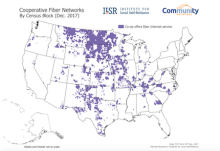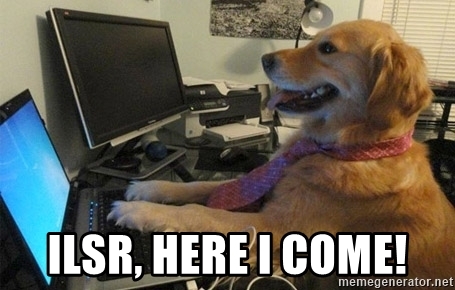
Fast, affordable Internet access for all.

Ready to see your name in lights? (Okay, okay, just 12 point font.)
The Institute for Local Self-Reliance is seeking a Broadband Writer and Editor to join the Institute’s Community Broadband Networks Initiative in Minneapolis, Minnesota.
The Community Broadband Networks team works to ensure all Americans have fast, affordable, and reliable Internet access by researching, reporting, and advising on issues such as community-owned broadband, network neutrality, and universal access. The new Broadband Writer and Editor will manage our site, MuniNetworks.org, and work closely with rest of our small but dedicated team.
View the listing on ILSR.org or below.
Responsibilities:
Monitoring an overwhelming number of Google alerts and other streams of information to keep track of local developments around community networks (15%)
A Successful Candidate Is:
Preferred Qualifications:
MuniNetworks.org offers a cache of resources for people who have a particular interest in publicly owned broadband networks. As interest in municipal networks has increased in recent years, connections between people can help those researching and organizing. We know that there aren't many places where our audience can have discussions with like-minded individuals, so the Institute for Local Self-Reliance has now established two mailing lists for folks who share our common interests related to municipal fiber networks.
Talkers, Organizers, a Meeting of the Minds
For folks who want to share thoughts on municipal networks with others, including new developments, news on projects, or trends and topics, they can sign up on our Muni Fiber Discussion mailing list.
The list will be lightly moderated and is not a place to dump links to stories; we expect people to share thoughts and ideas and to debate new issues and important developments.
Learn more about the Muni Fiber Discussion mailing list and subscribe here.
For people who are interested in taking steps to organize a community toward developing their own municipal network, we've established the Muni Organizing mailing list. We expect people interested in this conversation to include some of the same people as on the discussion list and others that may be interested related topics, including economic development, connectivity and education or telehealth, and people interested in other community benefits. This discussion will also be lightly moderated.
We imagine the Muni Organizing mailing list to be:
Discussions about efforts to create community networks. This is meant to help share strategies, solve common problems, and otherwise work through the many challenges that accompany this organizing effort. We expect this may include local activists, business leaders, elected officials, city staff, consultants working in this space, and others. However, our goal is to keep it limited to those actually working in this area - not just anyone.
You can get details about the Muni Organizing mailing list and subscribe here.
The Institute for Local Self-Reliance seeks a GIS and Data Visualization Intern to support ILSR’s Community Broadband Networks Initiative in Minneapolis, MN. We are looking for candidates that have a passion for policy and visualizing data. We work on a wide range of issues including universal Internet access, network neutrality, and municipal broadband. You will be working alongside the GIS and Data Visualization Researcher for the Community Broadband Networks Initiative with the opportunity to learn aspects of GIS and data analysis specific to a public policy setting. We strongly value a diverse workforce and are committed to the principle of equal employment opportunity. ILSR promotes an environment free of discrimination and harassment and our Minneapolis office is located in a welcoming neighborhood.
RESPONSIBILITIES:
QUALIFICATIONS:
You do not need to know much about broadband policy or telecommunications when you start.
COMPENSATION:
Position includes 15-20 hour work week, a $15/ hour wage and a dynamic workforce of dedicated and friendly policy wonks trying to make the world a better place.
TO APPLY:
If you’re reading this, you value the resources and research available at MuniNetworks.org. Perhaps you’ve benefited from our technical advice, or you rely on us to stay up to date on community broadband news. For a limited time we have a unique opportunity for support like you to boost the work we do within the Community Broadband Networks Initiative here at the Institute for Local Self-Reliance (ILSR).
Patagonia, a longtime foundation partner of ILSR, is matching all individual donations for a limited time. Individual donations are hugely important to us as an organization, and a match will allow you to make the biggest impact possible with your contribution.
Total funds from Patagonia are limited and the company is matching donations for a long list of great nonprofits like the Institute for Local Self-Reliance, so we're asking that you make your donation sooner rather than later before funds run out.
Up to $10,000 for each individual donation will be matched. Donations must be made through the Patagonia Action Works web page here.
Every dollar you give helps ensure we can continue and expand our work. As a reminder, there is a limited pool of money available, so take advantage of this generous opportunity and donate today!

The Institute for Local Self-Reliance (ILSR) seeks a Communications and Podcast Production Intern to support ILSR’s Community Broadband Networks Initiative in Minneapolis, Minnesota. We are looking for candidates with audio editing experience and an interest in communications strategy. We work on a wide range of issues, including universal Internet access, network neutrality, and municipal broadband. We strongly value a diverse workforce and are committed to the principle of equal employment opportunity. ILSR promotes an environment free of discrimination and harassment and our Minneapolis office is located in a welcoming neighborhood.
RESPONSIBILITIES:
QUALIFICATIONS:
You do not need to know much about broadband policy or telecommunications when you start.
HOURS AND COMPENSATION:
15-20 hours per week
$15/hour
TO APPLY:
Please use the subject line “Communications Internship Application” when sending your materials to delfiacco(at)ilsr.org. Include a cover letter, resume, and a writing sample. Applications are due Wednesday, Nov. 6.
When local communities apply for funding to improve local Internet infrastructure, grants and loans are often predicated on the need to deploy to unserved and underserved premises. Whether it's federal, state, or local sources, Federal Communications Commission (FCC) data determining whether or not a region has access to broadband is often the data that funding entities rely on. In recent years, it’s become apparent that FCC data grossly understates the lack of accessibility to broadband. Finally in August 2019, the FCC called for comments as they reconsider how to collect fixed broadband data. The Institute for Local Self-Reliance teamed up with Next Century Cities and several other organizations with whom we often collaborate, submitted both Comments and Reply Comments.
Fixing the Bad Data
We’ve covered this before, and the Commission has now decided to make changes. Traditionally, FCC data on broadband Internet access has been collected from Internet service providers (ISPs) that self-report on the areas they serve via Form 477. If a company has the ability to serve one premise in a census block they report to the Commission that they serve the entire block. Reality, however, often does not reflect such a high level of connectivity in one area.
When FCC data incorrectly determines that locations have the ability to subscribe to one or more Internet access companies, those areas lose eligibility for grants and loans for Internet network infrastructure. Sadly, these places are often caught in a strange purgatory between faulty FCC data and reality in which they can’t obtain funding to build out high-quality Internet access, and yet large Internet access companies don’t consider their areas a good investment due to low population densities.
You are interested in Internet policy issues, but there aren't too many places that offer internships to suit your requirements. You feel the need to help build more resilient economies and encourage a more vibrant democracy and believe that your interest in technology is a great place to start. You love research and writing. And, hey, you should be able to enjoy your surroundings and work with cool colleagues, right?
You should apply for this internship! Don't delay - deadline for applications is August 23, 2019.
The Institute for Local Self-Reliance seeks a part-time paid intern for our Community Broadband Networks program.
Our Ideal Intern:
The Kinds of Things We Do:
We offer a competitive wage, flexible hours, and the opportunity to gain experience in the growing high tech public policy field.
How To Apply
No calls, please!

An increasing number of local communities are realizing that investing in publicly owned Internet network infrastructure will lead to better connectivity. In order to help these communities in the early planning stages, the Institute for Local Self-Reliance and NEO Partners LLC have developed the Community Networks Quickstart Program.
Learn more at cnquickstart.com or email info@cnquickstart.com for more details.
We're Considering A Community Network, But….
Fiber optic, fixed wireless, a hybrid network…there are different possibilities for what type of technology is right for your community. You will also need to decide where to deploy and where to begin that deployment in order to help improve future success. You’ll want to hire engineers and consultants, but it would be helpful to have that extra dose of knowledge about facts and figures prior to working with them You want to know what questions to ask.
The Community Networks Quickstart Program will guide you through different deployment options — full Fiber-to-the-Premise, full wireless, and hybrid — each based specifically on your community and its specific needs. We use data that includes the size, population, and other characteristics of your community; we offer resources and advice to help you get started on the right foot. You also receive a recommended design that you can use when you apply for funding and refer to when you work with engineers, designers, and consultants. Our goal is not to replace the in-depth work that will come later, but to enhance it and to make your time with your consultants and other professionals more effective.
If your rural county has limited funds to dedicate toward broadband infrastructure deployment, one of your biggest challenges is deciding where to target that investment. The Community Networks Quickstart Program will help by examining different options so you can determine where your investment dollars will be most effective.
We're Helping People
Rock Island, Illinois, IT Director Tim Bain said:
"As we reached year-end I was able to identify a source of funds to proceed with the study in December 2018, and we had the results by January of 2019.
…

Decades after bringing electricity and telephone services to America’s rural households, cooperatives are tackling a new challenge: the rural digital divide. New updates to our report Cooperatives Fiberize Rural America: A Trusted Model for the Internet Era, originally published in 2017, illustrate the remarkable progress co-ops have made in deploying fiber optic Internet access across the country.
Download the updated report [PDF] here.
All versions of the report can be accessed from the Reports Archive for this report.
The report features new maps showing overall growth in areas served by co-ops, as well as expanded information about state legislation that supports co-op investment in broadband networks. A few important takeaways:
More than 140 co-ops across the country now offer residential gigabit Internet access to their members, reaching more than 300 communities.
Co-ops connect 70.8 percent of North Dakota and 47.7 percent of South Dakota landmass to fiber, and residents enjoy some of the fastest Internet access speeds in the nation.
Georgia and Mississippi have overturned state laws banning co-ops from offering Internet access, and other states, including Colorado, Maryland, North Carolina, and Texas, have implemented legislation that will further ease the way.
Co-ops have proven that this is a model that works. With increased support from federal and state governments, they will continue to connect rural Americans to economic and educational opportunities otherwise denied to them.
Read Cooperatives Fiberize Rural America: A Trusted Model For The Internet Era [PDF] here.
Summer is quickly approaching, which means we’re opening up opportunities for interns looking to gain some experience while classes are not in session. This year, we hope to find a Graphic Design Intern to help us develop more resources to help spread the word about publicly owned Internet networks. We want a creative person to fill this June 2019 - August 2019 opening; check out the posting below and apply before May 22, 2019.
Graphic Design Internship (Summer 2019) — Minneapolis, MN
The Institute for Local Self-Reliance (ILSR) is looking for a paid graphic design intern to work primarily with our Community Broadband Networks initiative. Our ideal candidate is enthusiastic about working to make the world a better place. You will get real life experience in educating the public on hot topics while learning how a nimble nonprofit policy organization works. You will have some tasks assigned but we want someone who can jump in with their own ideas as well.
This internship is paid $15/hour.
Application materials due: Wednesday, May 22, 2019.
Term of internship: June 2019 – August 2019 (these terms are negotiable, given school schedule and/or other commitments).
Position description: Designing in-house web and printed materials, including research reports, fact sheets, and promotional materials.
QUALIFICATIONS:
To apply, please submit cover letter and resume to Broadband(at)MuniNetworks.org using the subject line: Graphic Design Intern Application
